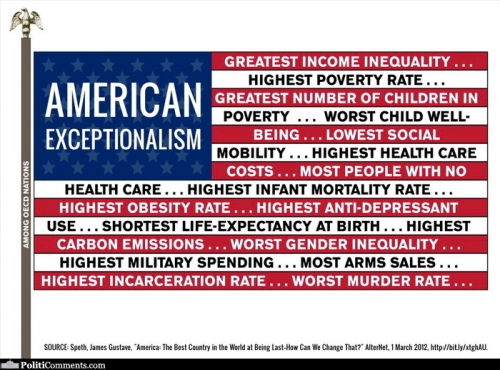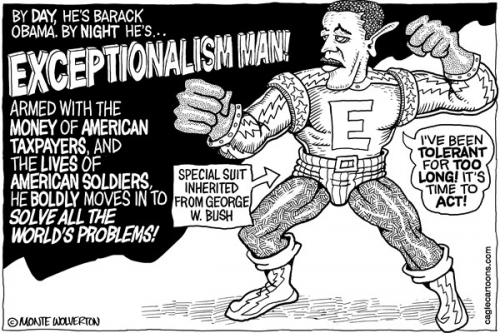
The ideas of Carl Schmitt (1888-1985), a man known as ‘the crown jurist of the Third Reich’, have enjoyed enormous currency among mainland Chinese scholars since the 2000s. The role of prominent academics such as Liu Xiaofeng 刘小枫, Gan Yang 甘阳 and Wang Shaoguang 王绍光 in promoting Schmitt’s ideas, and the fact that his theories on the state help legitimise one-party rule, have ensured that China’s ‘Schmittian’ discourse has been both fashionable and profitable (the usually heavy hand of the censors touches only ever so lightly on articles and books inspired by Schmitt).
Schmitt joined the German National Socialist, Nazi, party in 1933 when Adolf Hitler became Reichskanzler of the Third Reich and enthusiastically participated in the purge of Jews and Jewish influence from German public life. The anti-liberal and anti-Semitic Schmitt was a keen advocate of National Socialist rule and he sought to become the Third Reich’s official legal theorist. By late 1936, however, articles in the Schutzstaffel (SS) newspaper Das Schwarze Korps accused him of opportunism and Catholic recidivism. Despite the protection of Herman Göring, Schmitt’s more lofty ambitions were frustrated and thereafter he concentrated on teaching and writing.
Schmitt’s stark view of politics has attracted much criticism and debate in Euro-American scholarship. Thinkers on the left are ambivalent about his legacy, although despite the odeur of his Nazi past, he remains popular among theory-seeking academics. They see Schmitt’s ideas as deeply flawed while acknowledging his acuity and studying his writings for the insights they offer into the limitations of liberal politics, even as they impotently argue from the lofty sidelines of contemporary real-world governmentality.
In China, the reception of Schmitt’s ideas has been more straightforward; after all, even Adolf Hitler has enjoyed a measure of uncontested popularity in post-Mao China. Mainland scholars who seek to strengthen the one-party system have found in Schmitt’s writings useful arguments to bolster the role of the state, and that of the paramount leader (or Sino-demiurge), in maintaining national unity and order.
To date, Schmitt’s Chinese intellectual avatars have neglected a few key concepts in the meister’s oeuvre that could serve well the party-state’s ambitions under Big Daddy Xi Jinping. We think in particular of Schmitt’s views of Grossraum (‘Big Area’), or spheres of influence. Inspired by his understanding of the Monroe Doctrine propounded by the US in support of its uncontested hegemony in the ‘New World’, Schmitt’s Grossraum was to justify the German Reich’s European footprint and legalise its dominion. As China promotes its Community of Shared Destiny 命运共同体 in Asia and the Pacific (see our 2014 Yearbook on this theme), the concept of spheres of influence is enjoying a renewed purchase on the thinking of some international relations thinkers. See, for instance, the Australian scholar Michael Wesley’s unsettling analysis in Restless Continent: Wealth, Rivalry and Asia’s New Geopolitics (Black Ink, 2015).
During her time at the Australian Centre on China in the World in late 2013, the legal specialist Flora Sapio presented a seminar on the subject of Schmitt in China, and she kindly responded to our request to write a substantial essay on this important ‘statist’ trend in mainland intellectual culture for The China Story.
Flora Sapio is a visiting fellow at the Australian Centre on China in the World. Her research is focused on criminal justice and legal philosophy. She is the author of Sovereign Power and the Law in China (Brill, 2010); co-editor of The Politics of Law and Stability in China (Edward Elgar, 2014); and, Detention and its Reforms in China (forthcoming, Ashgate, 2016). — The Editors
___________________
We set up an ideal form [eidos],
which we take to be a goal [telos],
and we then act in such a way
as to make it become fact. [1]
The Schmittian intellectual likes to play Russian roulette but with an intriguing new twist: she believes that a single round has been placed in the revolver but she also knows this may not be the case. In fact, the only one who knows the truth is the Sovereign, a figure whose will the Schmittian cannot fathom. The Sovereign decides who plays the game and how many times. If the Schmittian turns downs this offer that can’t be refused, she would be declared an enemy and shot. Given how this intellectual predicament, masquerading as a position, commits one to always comply with the Diktat of the Sovereign, we must ask ourselves: why have several prominent Chinese intellectuals elected Herr Professor Carl Schmitt, Crown Jurist of the Third Reich, to be their intellectual patron saint?
Fulfilling a dream of wealth and power has been a feature of Chinese history and intellectual life since the late-nineteenth century. Chinese dreams, whether they be those dreamt up around the time of the 1919 May Fourth Movement, or the visions conjured up almost a century later by party-state-army leader Xi Jinping, involve a conviction that China is endowed with a distinctive national essence 国粹. The national essence is to China what the soul is to man. Just as (religious) man seeks to ascend to heaven by cultivating and purifying his soul, China can become wealthy and powerful if its national essence is enhanced and cleansed of polluting influences. The New Enlightenment Movement which emerged following the ideological thaw of the late 1970s saw traditionalism and feudalism being accused of holding China back. In the 1980s, Chinese intellectuals argued over how to revive the nation’s true nature, with many recommending an eclectic combination of Western values, theories and models in the process.[2] The Movement would witness a reversal of fortunes after the 1989 Beijing Massacre. Powerful nationalist sentiments followed in the 1990s, fuelled in part by the state and in part by a reaction to the inequalities of market reform, coupled with the public’s response to external events.
Telling Friend from Enemy

Liu Xiaofeng
It is against this fast-changing backdrop that China’s Carl Schmitt fever must be situated. It would be wrong to see the ‘invisible hand’ of the State at work behind the fad.[3] The reception of Carl Schmitt by Chinese intellectuals, some of whom are key members of the New Left, was possible only because of the work undertaken by the influential scholar Liu Xiaofeng 刘小枫 (currently a professor at Renmin University in Beijing) to translate, comment on and promote Schmitt’s opera omnia. The holder of a theology doctorate from the University of Basel, Liu argued in his PhD thesis for Christianity to be separated from both its ‘Western’ and ecclesiastical dimensions, thereby allowing Christian thought to be treated purely as an object of academic research. Christian thought, so conceived, could thus be put in dialogue with other disciplines and contribute, among other things, to the modernisation of Chinese society. Liu related the development of Christianity to the development of nations and their identities, reflecting Max Weber’s argument in The Protestant Ethic and the Spirit of Capitalism, a book that was widely read in Chinese translation and highly influential in 1980s’ mainland intellectual circles.
Liu argued that in China Christianity took root in a unique way and was independent of missionary evangelisation. Liu’s sinicisation of Christian theology enabled the development of a Sino-Christian discourse in mainland intellectual circles focused on solving ‘Chinese problems’.[4] This was, and remains, a discourse that engages with such issues as economic development, social justice, social stability and most important of all, the political legitimacy of Communist Party rule.
Liu calls himself a ‘cultural Christian’, meaning a Christian without church affiliation: one who conducts research on theological arguments and concepts for the benefit of his nation. It is no surprise then that by understanding research in these terms, Liu soon developed a fervid interest in Carl Schmitt. To Carl Schmitt, the state has a theological origin — it must be conceived of as a divine-like entity if it is to hold back chaos and disorder so as to secure peace and prosperity. Schmitt’s thesis also implies that all modern political concepts originate in theology, which in turn makes theology amenable to being treated as a form of statecraft.[5] From the outset, Liu showed himself highly receptive to these Schmittian ideas. We must also note the ease with which the writings of Carl Schmitt succeeded in China. Unlike Chinese scholarship based on Western liberal-democratic models, which was and remains prone to censorship, Chinese aficionados of Schmitt’s ‘friend-enemy’ distinction and his critique of parliamentary democracy were unimpeded in their pursuits.
As a conservative Catholic, Schmitt understood politics (which he termed ‘the Political’, in an attempt to capture its essence) as based ultimately in the friend-enemy distinction. For Chinese intellectuals who had been brought up on Maoist rhetoric,[6] and were familiar with the adaptation of this dyad of friend-enemy 敌我 for post-Maoist political use,[7] Schmitt’s friend-enemy distinction had a powerful resonance. This was a distinction that could be used to name any pair of antagonists, as long as the attributes of the named antagonists could be demonstrated to be so thoroughly incommensurable as to make them want to destroy each other, in order for each to preserve its own identity.
The friend-enemy distinction was a central feature of Schmitt’s political and constitutional theory: it grounded his critique of parliamentary democracy as well as his ideas about ‘the state of exception’ and sovereignty. Liberal democracies, Schmitt held, were trapped in false political categories: they ignored the crucial distinction between friend and enemy and therefore exposed themselves to the risk of capture by the interests of wealthy individuals and factions, who would use the state for their own goals rather than for the greater good of the people. According to Schmitt, liberal polities pretended that the government and the people were subject to the demands of reliable legal norms but the pretence was shattered whenever an internal or external enemy threatened the nation and national security. Reliance on parliamentary debates and legal procedures, he argued, posed the risk of throwing a country into chaos because they hampered the adoption of an effective and immediate response.
Schmitt held that sovereignty resides not in the rule of law but in the person or the institution who, in a time of extreme crisis, has the authority to suspend the law in order to restore normality. The authority to declare a state of emergency or Ausnahmezustand thus has unquestioned legitimacy, regardless of whether it takes the form of an actual (written) constitution or an implicit (unwritten) one. Yet how can a sovereign power that exists above and outside the law enjoy any legitimacy? Wouldn’t such a power be self-referential and premised on sheer violence? According to Schmitt, the legitimacy of such a power can be defended if one delinks the concepts of liberalism and democracy. He held that the two were substantially distinct and set about redefining the latter.
Schmitt argued that a polity founded on the sways of popular opinion could hardly be legitimate. He appealed instead to ideas about equality and the will of the people.[8] For Schmitt, political equality meant a relationship of co-belonging between the ruler and the ruled. As long as both ruler and ruled were members of the same group, or ‘friends’ holding identical views about who the enemy was, a polity was democratic. Schmitt held that where the will of the people mirrored the sovereign’s decision, rule was, indeed, by the people. Such a popular will need not be formed or expressed in terms of universal suffrage: the demands made at a public rally were sufficient to convey a popular will at work.[9]
Schmitt’s eclectic definition of the popular will led him to conceive of democracy as a democratic dictatorship. This way of thinking was very attractive to intellectuals who favoured statist and nationalist solutions to political problems and issues of international relations.[10]

Why Schmitt?
The reasons for Chinese intellectuals’ fascination with Carl Schmitt are straightforward. The related concepts of ‘friend and enemy’, ‘state of exception’ and ‘decisionism’ are simple and usable. Policy advisors and policy-makers can easily apply these concepts in their analysis of situations. Schmitt’s vocabulary can also lend theoretical weight to the articulation of reform proposals, to serve as a source of inspiration or to furnish building blocks in the construction of pro-state arguments in political science and constitutionalism. Moreover, Schmitt’s friend-enemy distinction complements and provides justification for the many narratives of nationalism and cultural exceptionalism that have become influential in Chinese scholarship in recent years. These narratives are by no means unique to China but we must note that they are at odds with the universalist and internationalist aspects of Chinese Communism as state doctrine. The gist of the Chinese Schmittian argument is that the world is not politically homogeneous but a pluriverse where radically different political systems exist in mutual antagonism. China, accordingly, is not only entitled to but must find and defend its own path to power and prosperity.
The Chinese Schmittian argument justifies the party-state’s view that Western parliamentary democracy, thick versions of the rule of law, civil society, and the values and institutions of Western constitutionalism are all unsuitable for China. Schmitt’s argument allows those who hold this view to say that such ideas belong to an ‘alien’ liberal cosmopolitanism that is ultimately damaging for the Chinese way of life. In 2013, a state directive dubbed ‘Document 9’, outlined these ideas as posing a serious threat to China’s ‘ideological sphere.’[11]
Carl Schmitt’s views have now become influential in mainland Chinese scholarship and he is frequently quoted as a foreign authority in arguments mounted against ‘liberalism’ and Western or US-inspired models of economic and political development. But the fact that Schmitt’s philosophy premises politics on exclusion and even the physical elimination of the enemy (should such an elimination be deemed necessary to the achievement of an ideological goal), is something never raised in Chinese intellectual discourse. The friend-enemy distinction encourages a stark form of binary thinking. The category of friend, however substantively defined, can be conceived only by projecting its opposite. ‘Friend’ acquires meaning through knowing what ‘enemy’ means. The attributes used to define a ‘friend’ can, as Schmitt pointed out, be drawn from diverse sources. Religion, language, ethnicity, culture, social status, ideology, gender or indeed anything else can serve as the defining element of a given friend-enemy distinction.
The friend-enemy distinction is a public distinction: it refers to friendship and enmity between groups rather than between individuals. (Private admiration for a member of a hostile group is always possible). The markers of identity, however, are relatively fluid because a political community is formed via the common identification of a perceived threat.[13] In other words, it is through singling out ‘outsiders’ that the community becomes meaningful as an ‘in-group’. This Schmittian way of defining a ‘people’ elides the necessity of a legal framework. A ‘people’, as a political community in the Schmittian sense, is primarily concerned about whether a different political community (or individuals capable of being formed into a community) poses a threat to their way of life. For Schmitt, the friend-enemy distinction is a purely political distinction and to be treated as entirely separate from ethics.[14] Since the key concern is the survival of the ‘in-group’ as a ‘people’ and a political community, Schmitt’s argument implies that the elimination of a perceived enemy can be justified as a practical necessity.[15] Hence, those who call themselves Schmittian intellectuals should be aware that Schmitt’s argument is framed around necessity. So long as a there is a necessary cause to defend, any number of deaths can be justified.
Moreover, necessity is premised on antagonism. The friend-enemy distinction grounds every aspect of Schmitt’s thinking about politics and constitutionalism. But this is precisely why Schmittian concepts have inspired some of the most effective analyses of Chinese politics and constitutionalism. Schmitt’s view of sovereignty as requiring the ruler to have the freedom to intervene as necessary for the good of the whole country is of a piece with the ‘statist intellectual trend’ 国家主义思潮 in Chinese scholarship of which Wang Shan 王山 and Wang Xiaodong 王小东 were and remain key proponents.
This movement led to the development of an argument around the importance of ‘state capacity’. In an influential 2001 work, the political scientists Wang Shaoguang 王绍光 and Hu Angang 胡鞍钢 presented ‘state capacity’ as the key to good governance and policy. They argued against democratic decision-making processes by outlining their adverse consequences. According to them, such processes can involve lengthy discussions, leading to delays in policy implementation or even to political and institutional paralysis. They saw ‘the capacity on the part of the state to transform its preference into reality’ as crucial for protecting the nation’s well-being.[16] Since then, there have been many academic publications in mainland China that present ‘state capacity’ with its corollaries of social control and performance-based legitimacy as a viable alternative to parliamentary democracy.
Quotable and Useful Ideas

Wang Shaoguang
In a subsequent work provocatively titled Four Chapters on Democracy,[17] Wang Shaoguang pays implicit tribute to Carl Schmitt’s Four Chapters on the Concept Sovereignty. Like Schmitt, Wang rejects representative democracy on the pragmatic and utilitarian grounds that such a system is ultimately incapable of improving the welfare of the entire population. Echoing the Schmittian argument of parliamentarianism’s capture by interest groups, Wang argues that universal suffrage plays into the hands of those endowed with financial means, while reducing the have-nots to the role of passive spectators.
Wang also presents a Schmittian-inspired notion of ‘the people’ as the basis of a responsive democracy, arguing that countries with a strong assimilative capacity and steering capacity (that is, the people united under a strong leader) have a higher quality of democracy. Some of Wang’s vocabulary has come from democratic political theorist Robert Dahl, but it is Schmitt’s argument that underlies Wang’s explanations of responsive democracy and state effectiveness.[18]
The ‘state capacity’ argument advanced by Wang, Hu and others has enjoyed the attention of Western scholarship on contemporary China for a decade or more. It is frequently cited in academic publications about China’s economy, political economy and public administration.
In many of these published studies (in English and other European languages), ‘state capacity’ is treated as having afforded the Chinese government an effective means for accelerating China’s economic development. The evidence of China’s economic success, in turn, has also encouraged some academics to propose that an authoritarian government may be more efficient in delivering economic growth than a liberal-democratic one. It is baffling that among those who hold this view, some have also claimed to ‘support China’s transition to a more open society based on the rule of law and human rights’.[19] If by ‘more open’ they mean greater freedom of the liberal-democratic variety, then this goal is at odds with their argument that the Chinese Communist Party’s one-party system must be strengthened through a range of capacity-building initiatives.
Schmitt’s argument has also been very influential in mainland scholarship on constitutional theory. After Mao, the party-state needed — and to an extent still needs — a distinctively Chinese political ontology. This ontology — or way of conceptualizing and understanding the world — has to include a bipartite political system, in which an extensive party apparatus exists both inside and outside the law, wielding supreme power over the state. Furthermore, this party-state system has to be internally coherent: capable of self-perpetuation to enjoy legitimacy in the eyes of both the Chinese people and foreigners. Chinese legal academics such as Qiang Shigong 強世功, who view constitutionalism in these terms, began in the 2000s to defend their position by deploying the whole arsenal of Schmittian philosophy. The result was a trinity of concepts: ‘the state of exception’, ‘constituting and constituted power’ and ‘political representation by consensus’ (representing respectively the terms State, Movement and People as used by Schmitt in his 1933 work, Staat, Bewegung, Volk), which these academics hailed as the true essence of Chinese law.
When Schmitt is directly quoted, his influence is obvious. But there are scholars such as Cui Zhiyuan 崔之元 who have made tacit use of Schmitt in their theorising about governance and politics in China. Schmitt’s influence is evident in Cui’s understanding of China as a ‘mixed constitution’ involving ‘three political levels’.[20] Similarly, Chen Ruihong’s 陈瑞洪 notion of ‘virtuous unconstitutionality’;[21] Han Yuhai’s 韩毓海 doctrine of ‘constitutionalism in a proletarian state’;[22] Hu Angang’s 胡鞍钢 rebranding of the Politburo as a ‘collective presidency’;[23] Qiang Shigong’s 强世功 model of ‘shared sovereignty under a party-state leader’,[24] are other prominent Schmittian-inspired arguments to have emerged in the last two decades. These theories belong to different areas of Chinese constitutional scholarship,[25] but they all recast the Schmittian sovereign in Chinese party-state garb. Specifically, each of these theories defends political representation by consensus, linking consensus to broad acceptance of the Diktat of the party-state. In one way or another, they also all present the ‘West’ and its political and legal institutions as unsuited for China.
To date, Western legal scholarship has properly examined neither these influential arguments nor their legal and political ramifications. But there are several scholars who have indicated the relevance of these arguments for China. For instance, Randall Pereenboom presents a useful account of the Chinese legal system as a pluriverse populated by different conceptions of the rule of law.[26] Michael Dowdle has argued, in sympathy with the New Left position, that liberal conceptions of constitutionalism are limited and that there is room for state power to be legitimated in other ways.[27] Larry Catà Backer has conceived the Party and the State as a unitary whole, a theoretical construct inspired by the reality of Chinese institutions, which allows for shuanggui 双规 detention on legal grounds.[28] These works can be read as putting the finger in the wound of some of our own contradictions. We may criticise the Chinese legal system from the purview of an idealised model of the Western legal system but at the same time we cannot avoid dealing with Chinese law as it is discussed and presented, and as it exists within the People’s Republic of China.
Several mainland intellectuals have pointed out that although Chinese Schmittians are fond of attacking the West, they don’t explain why they rely on a German political thinker to do so.[29] This criticism is useful, but it ignores how advocates of indigenous concepts and models, ‘Third Way’ proponents and Western-style liberals alike have yet to examine their uses of a logic that belongs more to Western metaphysics than to indigenous Chinese thought (Confucian or other forms of thinking derived from pre-Qin sources). This Western logic requires one to construct an ideal model of how a political system, a legal system, a society or truly any other entity should be, into which we then attempt to ‘fit’ reality, often without heeding the consequences of doing so.
At any rate, we can see that Schmittian concepts have become far more dominant than liberal ones in mainland legal scholarship. Political moderates such as He Baogang 何包钢[30] have sought to accommodate the arguments of both sides by proposing, for instance, that a constitutional court should have the power to decide on what constitutes a ‘state of exception’, on which the absolute authority of a Schmittian sovereignty is predicated. But such attempts at accommodation only reveal the weakness of the liberal position by comparison with the Schmittian one. Professor He reflects the quandary of those who seek to defend elements of a liberal democratic model (such as judicial independence) within an unaccommodating Schmittian friend-enemy paradigm.
Schmitt und Xi
Since Xi Jinping became China’s top leader in November 2012, the friend-enemy distinction so crucial to Carl Schmitt’s philosophy has found even wider applications in China, in both ‘Party theory’ and academic life. The selective revival of the Maoist rhetoric of struggle to launch a new mass line education campaign on 18 June 2013 is a good example of how the friend-enemy distinction has been adapted for present-day one-party rule.
To see the consequences of Schmittian reasoning, it is important that we consider the motivations behind Carl Schmitt’s privileging of the friend-enemy distinction and absolute sovereignty. Schmitt believed that he was theorising on behalf of the greater good. His philosophy can be rightly described as a political theology because it was inspired by the Biblical concept of kathechon [from the Greek τὸ κατέχον, ‘that what withholds’, or ὁ κατέχων, ‘the one who withholds’] — the power that restrains the advent of the Anti-Christ.[31] Schmitt transposed kathechon into a political register, defining it as the power that maintains the status quo.[32] This power can be exercised by an institution (such as the nation-state) or by the sovereign (whether as dictator or defender of the constitution). A logical consequence of Schmitt’s belief in the kathecon was the conflation of religious and political imagery. Forces which were against a given sovereignty were nothing less than evil enemies sowing the seeds of chaos and disorder. Accordingly, to protect one’s nation or sovereign was a sacred duty and the path to salvation.
We may fundamentally disagree with Chinese intellectuals who have opted to promote a Schmittian worldview. But if we are to defend intellectual pluralism, we must accept that people are free to choose their own point of view. In fact, the emergence of a Chinese Schmittian discourse in academic scholarship augments the current range of Schmittian-inspired arguments produced as much by scholars on the right as on the left in European and American settings.
We must also note that in China, as everywhere else, political differences of the left and right, or between the New Left and liberals, emerge out of and remain largely trapped in a common setting: what may be called a common political-theological paradigm, to use Schmitt’s vocabulary. Political differences are made meaningful in a common setting, out of which people receive and develop their mental schemes, their political vocabularies and the entire universe of concepts for thinking politics. The political-theological paradigm of one-party rule in the People’s Republic of China has ensured that Chinese intellectuals are bound to the mental schemes, vocabularies and concepts that this paradigm has allowed to be generated. What we must bear in mind is that Western ideas must also be accommodated into the paradigm.
Living in a country that has witnessed a rapid rise to economic wealth and global power over three decades, Schmittian intellectuals in today’s China have sought to marry a philosophy that emerged and developed in Germany from the 1920s to the 1940s with ideas about statehood that first became popular in China in the 1980s. This mix of Schmittian thinking and ‘statism’ has now become very influential in Chinese academic circles. But there doesn’t seem to be much concern about the destructive potential of Carl Schmitt’s philosophy.
_____________
Notes:
* The author would like to thank the editors of The China Story, in particular Gloria Davies, for their intellectual and stylistic contributions to this study. Subheadings have been added by the editors.
[1] François Jullien, A Treatise on Efficacy: Between Western and Chinese Thinking, Honolulu: University of Hawai’i Press, 2004, p.1.
[2] On the New Enligthenment Movement, see Xu Jilin, ‘The Fate of an Enlightenment — Twenty Years in the Chinese Intellectual Sphere (1978–1998)’, Geremie R Barmé and Gloria Davies, trans, East Asian History, n.20 (2000): 169–186. More generally, and critically, see Zhang Xudong, ed., Whither China: Intellectual Politics in Contemporary China, Durham: Duke University Press, 2001, Part I.
[3] The study of European philosophy was not a priority of the Ninth Five Year Plan on Research in the Social Sciences and Philosophy 国家哲学社会科学研究九五规划重大课题, which covered the period from 1996 to 2000, and Liu Xiaofeng’s first publication on Carl Schmitt, a review of Renato Cristi’s book Carl Schmitt and Authoritarian Liberalism, dates to 1997. See Liu Xiaofeng 刘小枫, ‘Shimite gushide youpai jiangfa: quanwei ziyouzhyi?’ 施米特故事的右派讲法: 权威自由主义? , 28 September 2005, online at: http://www.aisixiang.com/data/8911.html. On the Ninth Five Year Plan, see Guojia Zhexue Shehui Kexue Yanjiu Jiuwu (1996–2000) Guihua Bangongshi 国家哲学社会科学研究九五 (1996–2000) 规划办公室, Guojia Zhexue Shehui Kexue Yanjiu Jiuwu (1996–2000) Guihua 国家哲学社会科学研究九五 (1996–2000) 规划, Beijing 北京: Xuexi chubanshe 学习出版社, 1997.
[4] Liu Xiaofeng 刘小枫, ‘Xiandai yujing zhongde hanyu jidu shenxue’ 现代语境中的汉语基督神学, 2 April 2010, online at: http://www.aisixiang.com/data/32790.html. On Sino-Christian theology, see also Yang Huiling and Daniel HN Yeung, eds, Sino-Christian Studies in China, Newcastle: Cambridge Scholars Press, 2006; Pan-chiu Lai and Jason Lam, eds, Sino-Christian Theology: A Theological Qua Cultural Movement in Contemporary China, Frankfurt am Main: Peter Lang, 2010; and, Alexander Chow, Theosis, Sino-Christian Theology and the Second Chinese Enlightenment: Heaven and Humanity in Unity, New York: Peter Lang, 2013. For a mainstream commentary on Chinese Schmittianism, see Mark Lilla, ‘Reading Strauss in Beijing’, The New Republic, 17 December 2010, online at: http://www.newrepublic.com/article/magazine/79747/reading-leo-strauss-in-beijing-china-marx
[5] Carl Schmitt, Political Theology: Four Chapters on the Concept of Sovereignty, George Schwab, trans, Chicago: University of Chicago Press, 2005 p.36.
[6] Mao Zedong, ‘On the Correct Handling of Contradictions Among the People’, Selected Works of Chairman Mao Tsetung, Volume 5, edited by the Committee for Editing and Publishing the Works of Chairman Mao Tsetung, Central Committee of the Communist Party of China, Beijing: Foreign Language Press, 1977, pp.348–421.
[7] For an exploration of its uses in the field of public security, see Michael Dutton, Policing Chinese Politics: A History, Durham: Duke University Press, 2005.
[8] Carl Schmitt, Dictatorship: From the origin of the modern concept of sovereignty to proletarian class struggle, Michael Hoelzl and Graham Ward, trans, Cambridge: Polity Press, 2014.
[9] Carl Schmitt, The Crisis of Parliamentary Democracy, Ellen Kennedy, trans, Cambridge and London: MIT Press, 2000; and, Carl Schmitt, Constitutional Theory, Jeffrey Seitzer, trans, Durham: Duke University Press, 2008.
[10] On the statist and nationalist intellectual trend, see Xu Jilin 许纪霖, ‘Jin shinianlai Zhongguo guojiazhuyi sichaozhi pipan’ 近十年来中国国家主义思潮之批判, 5 July 2011, online at: http://www.aisixiang.com/data/41945.html
[11] ‘Communiqué on the Current State of the Ideological Sphere. A Notice from the Central Committee of the Communist Party of China’s General Office’, online at: http://www.chinafile.com/document-9-chinafile-translation.
[12] As, for instance, a relationship of agonism, where the Schmittian enemy becomes an adversary. In this context, see Chantal Mouffe, On the Political. London and New York: Routledge, 2005.
[13] Carl Schmitt, The Concept of the Political, George Schwab, trans, Chicago: University of Chicago Press, 2007, p.38.
[14] Schmitt, The Concept of the Political, pp.25–27.
[15] Schmitt, The Concept of the Political, pp.46–48.
[16] By which Wang and Hu mean: ‘the ratio between the actual degree of intervention that the state is capable of realizing and the scope of intervention that the state hopes to achieve.’ See Wang Shaoguang and Hu Angang, The Chinese Economy in Crisis: State Capacity and Tax Reform, New York: ME Sharpe, 2001, p.190.
[17] Wang Shaoguang 王绍光, Minzhu sijiang 民主四讲, Beijing 北京: Sanlian shudian 三联书店, 2008.
[18] Wang Shaoguang, ‘The Problem of State Weakness’, Journal of Democracy 14.1 (2003): 36-42. By the same author, see ‘Democracy and State Effectiveness’, in Natalia Dinello and Vladimir Popov, eds, Political Institutions and Development: failed expectations and renewal hopes, London: Edward Elgar, 2007, pp.140-167.
[19] ‘EU-China Human Rights Dialogue’, online at: http://eeas.europa.eu/delegations/china/eu_china/political_relations/humain_rights_dialogue/index_en.htm
[20] Cui Zhiyuan 崔之元, ‘A Mixed Constitution and a Tri-level Analysis of Chinese Politics’ 混合宪法与对中国政治的三层分析, 25 March 2008, online at: http://www.aisixiang.com/data/18117.html
[21] Chen Ruihong 陈瑞洪, ‘A World Cup for Studies of Constitutional Law: a Dialogue between Political and Constitutional Scholars on Constitutional Power’ 宪法学的知识界碑 — 政治学者和宪法学者关于制宪权的对话, 5 October 2010, online at: http://www.aisixiang.com/data/36400.html; and, also Xianfa yu zhuquan 宪法与主权, Beijing 北京: Falü chubanshe 法律出版社, 2007.
[22] Han Yuhai 韩毓海, ‘The Constitution and the Proletarian State’ 宪政与无产阶级国家 online at: http://www.globalview.cn/ReadNews.asp?NewsID=34640.
[23] Hu Angang, China’s Collective Presidency, New York: Springer, 2014.
[24] Qiang Shigong 强世功, ‘The Unwritten Constitution in China’s Constitution’ 中国宪法中的不成文宪法, 19 June 2010, online at: http://www.aisixiang.com/data/related-34372.html.
[25] See also the special issue ‘The Basis for the Legitimacy of the Chinese Political System: Whence and Whither? Dialogues among Western and Chinese Scholars VII’, Modern China, vol.40, no.2 (March 2014).
[26] Randall Peerenboom, China’s Long March Towards the Rule of Law, Cambridge: Cambridge University Press, 2002.
[27] Michael Dowdle, ‘Constitutional Listening’, Chicago Kent Law Review, vol.88, issue 1, (2012-2013): 115–156.
[28] Larry Catá Backer and Keren Wang, ‘The Emerging Structures of Socialist Constitutionalism with Chinese Characteristics: Extra Judicial Detention (Laojiao and Shuanggui) and the Chinese Constitutional Order’, Pacific Rim Law and Policy Journal, vol.23, no.2 (2014): 251–341.
[29] Liu Yu 刘瑜, ‘Have you read your Schmitt today?’ 你今天施密特了吗?, Caijing, 30 August 2010, online at: http://blog.caijing.com.cn/expert_article-151338-10488.shtml option=com_content&view=article&id=189:2010-10-08-21-43-05&catid=29:works&Itemid=69&lang=en
[30] He Baogang 何包钢, ‘In Defence of Procedure: a liberal’s critique of Carl Schmitt’s theory of exception’ 保卫程序 一个自由主义者对卡尔施密特例外理论的批评, 26 December 2003, online at: http://www.china-review.com/sao.asp?id=2559
[31] ‘Let no man deceive you by any means: for that day shall not come, except there come a falling away first, and that man of sin be revealed, the son of perdition; Who opposeth and exalteth himself above all that is called God, or that is worshipped; so that he as God sitteth in the temple of God, shewing himself that he is God. Remember ye not, that, when I was yet with you, I told you these things? And now ye know what withholdeth that he might be revealed in this time. For the mystery of iniquity doth already work: only he who know letteth will tell, until he be taken out of the way’. See, The Bible: New Testament, 2 Thessalonians 2: 3-8.
[32] For a simple illustration, see Gopal Balakrishnan, The Enemy: An Intellectual Portrait of Carl Schmitt, London: Verso, 2002, Chapter 17. An overview of debates about the role of the katechon and a genealogy of the concept in Carl Schmitt’s political theology can be found in Julia Hell, ‘Katechon: Carl Schmitt’s Imperial Theology and the Ruins of the Future’, The Germanic Review, vol.84, issue 4, (2009): 283-325.
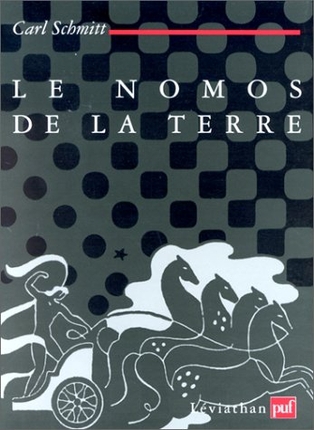 Cette vision d’un enracinement de fait et a priori de l’ordre semble évacuer la posture relativiste consistant à croire que ce sont les États et les nations qui plongent de force, à grands coups d’artifices, de symboles et de discours enflammés, un ordre qu’ils créent de toutes pièces dans le sol qu’ils dominent. Comme si l’enracinement se décrétait, comme s’il s’agissait de donner les attributs d’une force naturelle et le visage rassurant d’un mythe fondateur visant à unir un peuple à sa terre de façon quasi-mystique. Carl Schmitt met en échec ceux qui aujourd’hui encore voudraient voir en la notion d’un enracinement garant de l’ordre une pure abstraction romantique sans prise avec le réel, un outil superflu et ringard à dispositions des politiques, voire un mythe « nationaliste » du « repli sur soi et de la haine de l’autre », selon la formule abjecte désormais consacrée. En réalité nous découvrons que c’est tout l’inverse, car qui n’admet pas qu’une terre particulière est irrémédiablement liée à un ordre particulier – celui qui se prétend citoyen du monde, par exemple – considérerait que l’ordre auquel il consent à se conformer est valable partout : il violerait potentiellement toutes les terres, tous les ordres, tous les droits, à l’exception du sien.
Cette vision d’un enracinement de fait et a priori de l’ordre semble évacuer la posture relativiste consistant à croire que ce sont les États et les nations qui plongent de force, à grands coups d’artifices, de symboles et de discours enflammés, un ordre qu’ils créent de toutes pièces dans le sol qu’ils dominent. Comme si l’enracinement se décrétait, comme s’il s’agissait de donner les attributs d’une force naturelle et le visage rassurant d’un mythe fondateur visant à unir un peuple à sa terre de façon quasi-mystique. Carl Schmitt met en échec ceux qui aujourd’hui encore voudraient voir en la notion d’un enracinement garant de l’ordre une pure abstraction romantique sans prise avec le réel, un outil superflu et ringard à dispositions des politiques, voire un mythe « nationaliste » du « repli sur soi et de la haine de l’autre », selon la formule abjecte désormais consacrée. En réalité nous découvrons que c’est tout l’inverse, car qui n’admet pas qu’une terre particulière est irrémédiablement liée à un ordre particulier – celui qui se prétend citoyen du monde, par exemple – considérerait que l’ordre auquel il consent à se conformer est valable partout : il violerait potentiellement toutes les terres, tous les ordres, tous les droits, à l’exception du sien.




 del.icio.us
del.icio.us
 Digg
Digg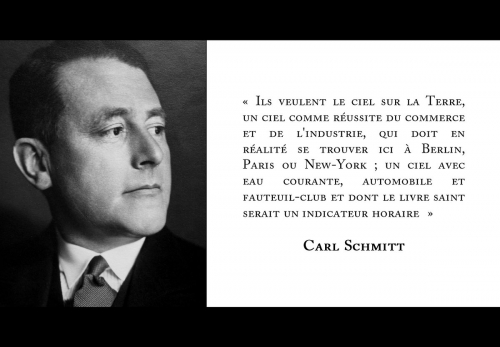

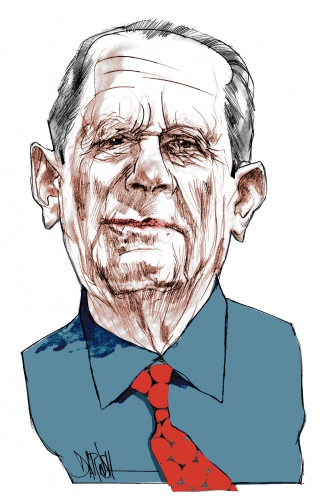 Nel 1945 il grande industriale tedesco Friedrick Flick, che aveva fondate ragioni di credere di venire accusato dagli alleati per la collaborazione a guerra d’aggressione, richiese a Carl Schmitt un parere per la difesa da tale (eventuale) accusa. Accusa che non venne mai mossa a Flick, il quale fu tuttavia condannato per un “capo d’imputazione” diverso: lo sfruttamento di manodopera straniera deportata dalle S.S..
Nel 1945 il grande industriale tedesco Friedrick Flick, che aveva fondate ragioni di credere di venire accusato dagli alleati per la collaborazione a guerra d’aggressione, richiese a Carl Schmitt un parere per la difesa da tale (eventuale) accusa. Accusa che non venne mai mossa a Flick, il quale fu tuttavia condannato per un “capo d’imputazione” diverso: lo sfruttamento di manodopera straniera deportata dalle S.S..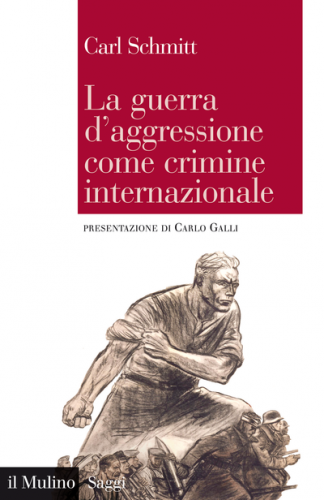 Schmitt valuta queste tre classi alla luce sia del “politico” che dei principi dello jus publicum europaeum. In primo luogo se la guerra è, nel sistema westphaliano, non solo un fatto pubblico ma che presuppone la distinzione tra pubblico e privato, allora non può farsi carico a un privato (come Flick) di aver concorso ad una guerra di aggressione.
Schmitt valuta queste tre classi alla luce sia del “politico” che dei principi dello jus publicum europaeum. In primo luogo se la guerra è, nel sistema westphaliano, non solo un fatto pubblico ma che presuppone la distinzione tra pubblico e privato, allora non può farsi carico a un privato (come Flick) di aver concorso ad una guerra di aggressione.
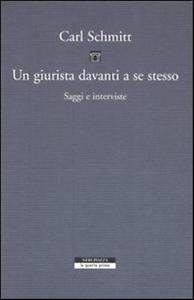 Schmitt è stato uno dei maggiori interpreti della crisi del XX secolo; la sua peculiare concezione del diritto ha fatto si che lui, giurista come si considerò sempre fino alla morte – ma come tutti i grandi giuristi portatore di una visione che trascende il mero orizzonte giuridico – sia stato in Italia apprezzato prevalentemente come politologo e filosofo della politica.
Schmitt è stato uno dei maggiori interpreti della crisi del XX secolo; la sua peculiare concezione del diritto ha fatto si che lui, giurista come si considerò sempre fino alla morte – ma come tutti i grandi giuristi portatore di una visione che trascende il mero orizzonte giuridico – sia stato in Italia apprezzato prevalentemente come politologo e filosofo della politica.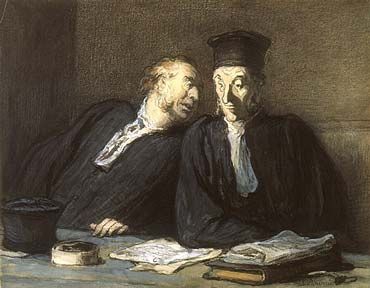 In particolare il potere costituente ha generato una prassi per il cambiamento di costituzione: “ogni rivoluzionario di professione ha imparato a maneggiarle: si destituisce il governo legale esistente, si convoca un «governo provvisorio» e si indice un’assemblea nazionale costituente… attraverso rivoluzioni grandi e piccole, europee e non europee, è sorta nell’arco di due secoli una prassi legittimante nella legalizzazione del colpo di stato e delle rivoluzioni”. Tuttavia è “difficile immaginare il trasferimento di un potere costituente dalla nazione all’umanità…L’organizzazione attuale della pace mondiale non è utile solo all’unità, ma anche allo status quo dei suoi numerosi membri sovrani. Dovremmo forse prospettarci un’assemblea plenaria dell’ONU p almeno una seduta del Consiglio di sicurezza che si svolga similmente a quella della notte del 4 agosto 1789, in cui i privilegiati rinunciarono festosamente a tutti i loro privilegi feudali?”.
In particolare il potere costituente ha generato una prassi per il cambiamento di costituzione: “ogni rivoluzionario di professione ha imparato a maneggiarle: si destituisce il governo legale esistente, si convoca un «governo provvisorio» e si indice un’assemblea nazionale costituente… attraverso rivoluzioni grandi e piccole, europee e non europee, è sorta nell’arco di due secoli una prassi legittimante nella legalizzazione del colpo di stato e delle rivoluzioni”. Tuttavia è “difficile immaginare il trasferimento di un potere costituente dalla nazione all’umanità…L’organizzazione attuale della pace mondiale non è utile solo all’unità, ma anche allo status quo dei suoi numerosi membri sovrani. Dovremmo forse prospettarci un’assemblea plenaria dell’ONU p almeno una seduta del Consiglio di sicurezza che si svolga similmente a quella della notte del 4 agosto 1789, in cui i privilegiati rinunciarono festosamente a tutti i loro privilegi feudali?”.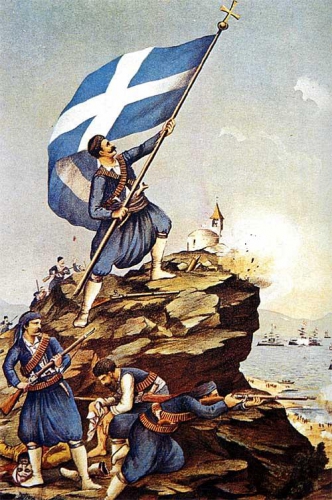 Le livre récent de Christian E. Roques
Le livre récent de Christian E. Roques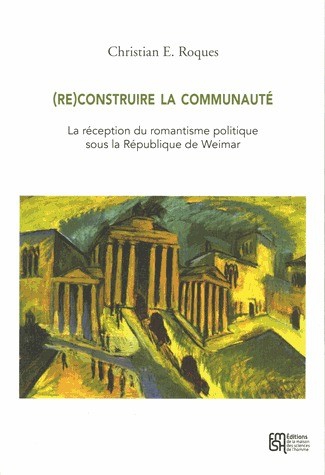
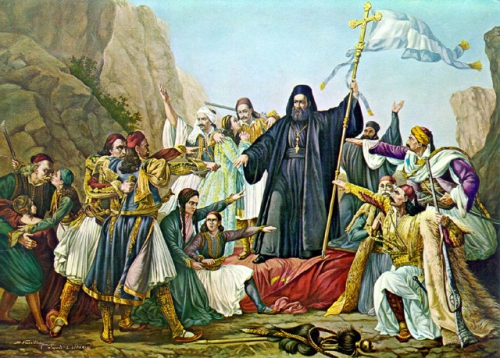

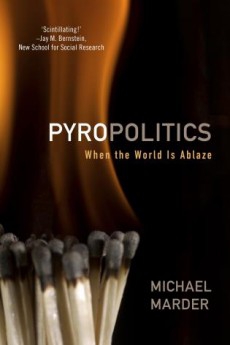 Qu’entendent les quelques politologues contemporains par « pyropolitique », concept qui vient d’être formé, notamment par le Professeur Michael Marder (cf. infra) ? Pour comprendre le contexte dans lequel ce vocable nouveau a émergé, il convient d’explorer deux domaines particuliers, exploration qui nous permettra de cerner le contenu même de la pyropolitique : le premier de ces domaines est celui de la théologie politique, avec, notamment, les réflexions de Juan Donoso Cortès sur le libéralisme, le socialisme et le catholicisme (posé, dans son œuvre, comme la « Tradition » à l’état pur) ; il faudra aussi, en explorant ce domaine de la théologie politique, relire les textes où Carl Schmitt affirme que tout concept politique moderne recèle en lui-même, quelque part, une racine théologique ; deuxième domaine à explorer dans l’œuvre politologique de Carl Schmitt : le corpus dans lequel le juriste de Plettenberg pose les confrontations du monde contemporain comme un choc permanent entre forces élémentaires brutes, de pré-socratique mémoire, en l’occurrence l’affrontement entre l’élément Terre et l’élément Eau. Toute expression réelle du politique (« das Politische ») étant, dans cette optique, une expression du facteur élémentaire « Terre », le politique en soi ne pouvant avoir qu’un ancrage tellurique, continental. Le véritable homme politique est alors une sorte de géomètre romain, explique Carl Schmitt dans son Glossarium publié après sa mort. Un géomètre qui mesure et organise le territoire qui tombe sous sa juridiction.
Qu’entendent les quelques politologues contemporains par « pyropolitique », concept qui vient d’être formé, notamment par le Professeur Michael Marder (cf. infra) ? Pour comprendre le contexte dans lequel ce vocable nouveau a émergé, il convient d’explorer deux domaines particuliers, exploration qui nous permettra de cerner le contenu même de la pyropolitique : le premier de ces domaines est celui de la théologie politique, avec, notamment, les réflexions de Juan Donoso Cortès sur le libéralisme, le socialisme et le catholicisme (posé, dans son œuvre, comme la « Tradition » à l’état pur) ; il faudra aussi, en explorant ce domaine de la théologie politique, relire les textes où Carl Schmitt affirme que tout concept politique moderne recèle en lui-même, quelque part, une racine théologique ; deuxième domaine à explorer dans l’œuvre politologique de Carl Schmitt : le corpus dans lequel le juriste de Plettenberg pose les confrontations du monde contemporain comme un choc permanent entre forces élémentaires brutes, de pré-socratique mémoire, en l’occurrence l’affrontement entre l’élément Terre et l’élément Eau. Toute expression réelle du politique (« das Politische ») étant, dans cette optique, une expression du facteur élémentaire « Terre », le politique en soi ne pouvant avoir qu’un ancrage tellurique, continental. Le véritable homme politique est alors une sorte de géomètre romain, explique Carl Schmitt dans son Glossarium publié après sa mort. Un géomètre qui mesure et organise le territoire qui tombe sous sa juridiction.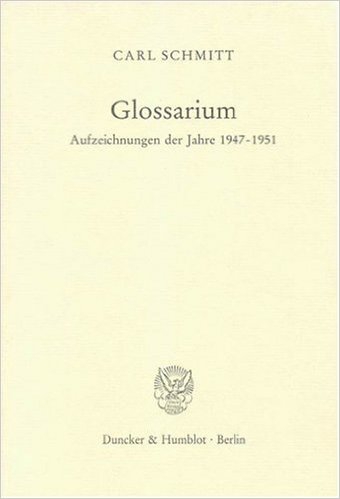 Cependant, même si la Terre est aujourd’hui un élément dominé, houspillé, cela ne veut pas dire qu’elle cesse d’exister, de constituer un facteur toujours potentiellement virulent : elle est simplement profondément blessée, elle gémit dans une hibernation forcée. Les forces hydropolitiques cherchent à détruire par tous moyens possibles cette terre qui ne cesse de résister. Pour parvenir à cette fin, l’hydropolitique cherchera à provoquer des explosions sur les lambeaux de continent toujours résistants ou même simplement survivants. L’hydropolitique thalassocratique va alors chercher à mobiliser à son profit l’élément Feu comme allié, un Feu qu’elle ne va pas manier directement mais confier à des forces mercenaires, recrutées secrètement dans des pays ou des zones urbaines en déréliction, disposant d’une jeunesse masculine surabondante et sans emplois utiles. Ces forces mercenaires seront en charge des sales boulots de destruction pure, de destruction de tout se qui ne s’était pas encore laissé submerger.
Cependant, même si la Terre est aujourd’hui un élément dominé, houspillé, cela ne veut pas dire qu’elle cesse d’exister, de constituer un facteur toujours potentiellement virulent : elle est simplement profondément blessée, elle gémit dans une hibernation forcée. Les forces hydropolitiques cherchent à détruire par tous moyens possibles cette terre qui ne cesse de résister. Pour parvenir à cette fin, l’hydropolitique cherchera à provoquer des explosions sur les lambeaux de continent toujours résistants ou même simplement survivants. L’hydropolitique thalassocratique va alors chercher à mobiliser à son profit l’élément Feu comme allié, un Feu qu’elle ne va pas manier directement mais confier à des forces mercenaires, recrutées secrètement dans des pays ou des zones urbaines en déréliction, disposant d’une jeunesse masculine surabondante et sans emplois utiles. Ces forces mercenaires seront en charge des sales boulots de destruction pure, de destruction de tout se qui ne s’était pas encore laissé submerger. 
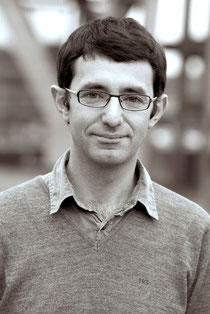 Lectures complémentaires (articles du Prof. Michael Marder):
Lectures complémentaires (articles du Prof. Michael Marder):



 What do political scientists mean when they talk about “pyropolitics”? There are two sources to explore in order to understand what they mean; first, you’ll have the whole realm of political theology to investigate, including Donoso Cortés’ thoughts about liberalism, socialism and Catholicism (this last being perceived as Tradition as such) and of course you’ll have to study thoroughly the core idea of Carl Schmitt, having proved that all political ideas have a theological background; second, you’ll have to take into consideration Schmitt’s perception of world politics as a clash between raw elements such as Earth and Water. Real politics, called in his genuine German as “das Politische,” is necessarily Earth-bound, continental and the truly efficient political man is a kind of Roman geometer who organizes the territory coming under his jurisdiction, by simply measuring it.
What do political scientists mean when they talk about “pyropolitics”? There are two sources to explore in order to understand what they mean; first, you’ll have the whole realm of political theology to investigate, including Donoso Cortés’ thoughts about liberalism, socialism and Catholicism (this last being perceived as Tradition as such) and of course you’ll have to study thoroughly the core idea of Carl Schmitt, having proved that all political ideas have a theological background; second, you’ll have to take into consideration Schmitt’s perception of world politics as a clash between raw elements such as Earth and Water. Real politics, called in his genuine German as “das Politische,” is necessarily Earth-bound, continental and the truly efficient political man is a kind of Roman geometer who organizes the territory coming under his jurisdiction, by simply measuring it. ISIS’ pyropolitics has as a collateral effect to ridicule the “light-without-warmth” Enlightenment ideologies of the Eurocratic elites. Light alone blinds and doesn’t produce genuine solutions for new problems that were induced by the disguised foe’s hydro- and pyropolitics. A blinding political ideology determined by light alone — that is also bereft of any “warmth-giving” feelings of security — is obviously bound to fail. European states become gradually failed states because they keep to “light-only-ideologies,” being only weakly challenged by so-called “warmth-demanding” populist movements. Europe is now undergoing a double aggression under two threats: the one of “light-without-warmth” ideological systems – leading to what Ernst Jünger defined as “post-history” — and the one of imported pyropolitics from the Muslim world formerly set ablaze by several factors, among which the total destruction of Saddam’s Iraq is the most important. ISIS’s pyropolitics aims at setting ablaze the Western European countries held erroneously responsible for the complete collapse of Near- and Middle Eastern countries. ISIS’ pyropolitics is nevertheless a quite complex problem: the religious element in it rebels savagely against the “light-only” all determining Western and global dominant ideology and promotes a pyropolitical “warmth-based” alternative exactly like a European counterpart of it would also aim at replacing the old-fashioned and bleak “light-only” ideological nuisances by more open-hearted and warmer political systems. The neoliberal avatar of the “light-only” ideology should therefore be replaced by a “warmth-giving” solidarism, i.e., a socialism that should have lost all the “coldness” that was attributed to Soviet or French communism by Kostas Papaioannou, a voice of Communist internal criticism in the ’60s and ’70s in France.
ISIS’ pyropolitics has as a collateral effect to ridicule the “light-without-warmth” Enlightenment ideologies of the Eurocratic elites. Light alone blinds and doesn’t produce genuine solutions for new problems that were induced by the disguised foe’s hydro- and pyropolitics. A blinding political ideology determined by light alone — that is also bereft of any “warmth-giving” feelings of security — is obviously bound to fail. European states become gradually failed states because they keep to “light-only-ideologies,” being only weakly challenged by so-called “warmth-demanding” populist movements. Europe is now undergoing a double aggression under two threats: the one of “light-without-warmth” ideological systems – leading to what Ernst Jünger defined as “post-history” — and the one of imported pyropolitics from the Muslim world formerly set ablaze by several factors, among which the total destruction of Saddam’s Iraq is the most important. ISIS’s pyropolitics aims at setting ablaze the Western European countries held erroneously responsible for the complete collapse of Near- and Middle Eastern countries. ISIS’ pyropolitics is nevertheless a quite complex problem: the religious element in it rebels savagely against the “light-only” all determining Western and global dominant ideology and promotes a pyropolitical “warmth-based” alternative exactly like a European counterpart of it would also aim at replacing the old-fashioned and bleak “light-only” ideological nuisances by more open-hearted and warmer political systems. The neoliberal avatar of the “light-only” ideology should therefore be replaced by a “warmth-giving” solidarism, i.e., a socialism that should have lost all the “coldness” that was attributed to Soviet or French communism by Kostas Papaioannou, a voice of Communist internal criticism in the ’60s and ’70s in France.

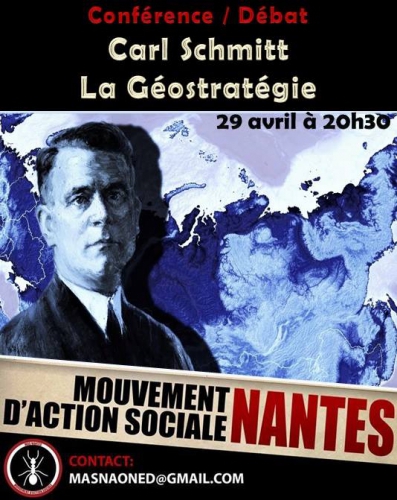
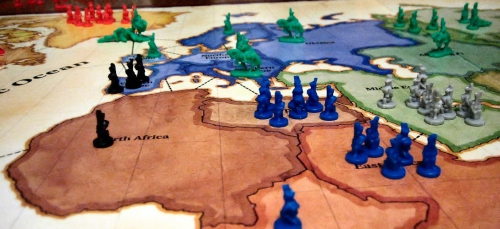
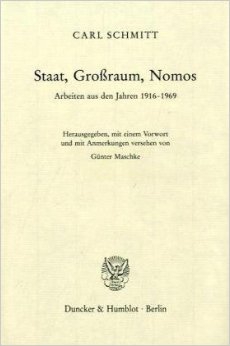 Si può comunque affermare con una certa sicurezza che attorno alla fine degli anni ’20 le tesi schmittiane subiscano un’evoluzione da una prima fase incentrata sulla “decisione” a una seconda che volge invece agli “ordini concreti”, per una concezione del diritto più ancorata alla realtà e svincolata non solo dall’eterea astrattezza del normativismo, ma pure dallo “stato d’eccezione”, assenza originaria da cui il diritto stesso nasce restando però co-implicato in essa.
Si può comunque affermare con una certa sicurezza che attorno alla fine degli anni ’20 le tesi schmittiane subiscano un’evoluzione da una prima fase incentrata sulla “decisione” a una seconda che volge invece agli “ordini concreti”, per una concezione del diritto più ancorata alla realtà e svincolata non solo dall’eterea astrattezza del normativismo, ma pure dallo “stato d’eccezione”, assenza originaria da cui il diritto stesso nasce restando però co-implicato in essa.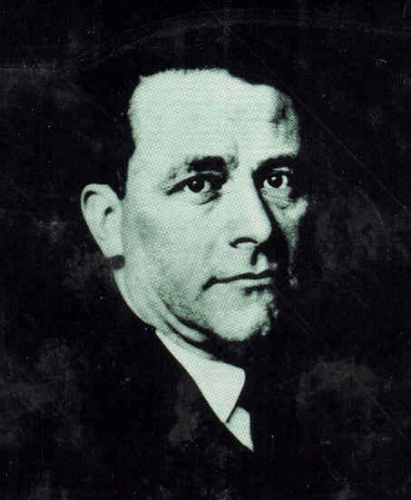 Lo spazio, cardine di quest’impianto teorico, viene analizzato nella sua evoluzione storico-filosofica e con riferimenti alle rivoluzioni che hanno cambiato radicalmente la prospettiva dell’uomo. La modernità si apre infatti con la scoperta del Nuovo Mondo e dello spazio vuoto d’oltreoceano, che disorienta gli europei e li sollecita ad appropriarsi del continente, dividendosi terre sterminate mediante linee di organizzazione e spartizione. Queste rispondono al bisogno di concretezza e si manifestano in un sistema di limiti e misure da inserire in uno spazio considerato ancora come dimensione vuota. È con la nuova rivoluzione spaziale realizzata dal progresso tecnico – nato in Inghilterra con la rivoluzione industriale – che l’idea di spazio esce profondamente modificata, ridotta a dimensione “liscia” e uniforme alla mercé delle invenzioni prodotte dall’uomo quali «elettricità, aviazione e radiotelegrafia», che «produssero un tale sovvertimento di tutte le idee di spazio da portare chiaramente (…) a una seconda rivoluzione spaziale» (Ivi, p.106). Schmitt si oppone a questo cambio di rotta in senso post-classico e, citando la critica heideggeriana alla res extensa, riprende l’idea che è lo spazio ad essere nel mondo e non viceversa. L’originarietà dello spazio, tuttavia, assume in lui connotazioni meno teoretiche, allontanandosi dalla dimensione di “datità” naturale per prendere le forme di determinazione e funzione del “politico”. In questo contesto il rapporto tra idea ed eccezione, ancora minacciato dalla “potenza del Niente” nella produzione precedente, si arricchisce di determinazioni spaziali concrete, facendosi nomos e cogliendo il nesso ontologico che collega giustizia e diritto alla Terra, concetto cardine de Il nomos della terra, che rappresenta per certi versi una nostalgica apologia dello ius publicum europaeum e delle sue storiche conquiste. In quest’opera infatti Schmitt si sofferma nuovamente sulla contrapposizione terra/mare, analizzata stavolta non nei termini polemici ed oppositivi di Terra e mare
Lo spazio, cardine di quest’impianto teorico, viene analizzato nella sua evoluzione storico-filosofica e con riferimenti alle rivoluzioni che hanno cambiato radicalmente la prospettiva dell’uomo. La modernità si apre infatti con la scoperta del Nuovo Mondo e dello spazio vuoto d’oltreoceano, che disorienta gli europei e li sollecita ad appropriarsi del continente, dividendosi terre sterminate mediante linee di organizzazione e spartizione. Queste rispondono al bisogno di concretezza e si manifestano in un sistema di limiti e misure da inserire in uno spazio considerato ancora come dimensione vuota. È con la nuova rivoluzione spaziale realizzata dal progresso tecnico – nato in Inghilterra con la rivoluzione industriale – che l’idea di spazio esce profondamente modificata, ridotta a dimensione “liscia” e uniforme alla mercé delle invenzioni prodotte dall’uomo quali «elettricità, aviazione e radiotelegrafia», che «produssero un tale sovvertimento di tutte le idee di spazio da portare chiaramente (…) a una seconda rivoluzione spaziale» (Ivi, p.106). Schmitt si oppone a questo cambio di rotta in senso post-classico e, citando la critica heideggeriana alla res extensa, riprende l’idea che è lo spazio ad essere nel mondo e non viceversa. L’originarietà dello spazio, tuttavia, assume in lui connotazioni meno teoretiche, allontanandosi dalla dimensione di “datità” naturale per prendere le forme di determinazione e funzione del “politico”. In questo contesto il rapporto tra idea ed eccezione, ancora minacciato dalla “potenza del Niente” nella produzione precedente, si arricchisce di determinazioni spaziali concrete, facendosi nomos e cogliendo il nesso ontologico che collega giustizia e diritto alla Terra, concetto cardine de Il nomos della terra, che rappresenta per certi versi una nostalgica apologia dello ius publicum europaeum e delle sue storiche conquiste. In quest’opera infatti Schmitt si sofferma nuovamente sulla contrapposizione terra/mare, analizzata stavolta non nei termini polemici ed oppositivi di Terra e mare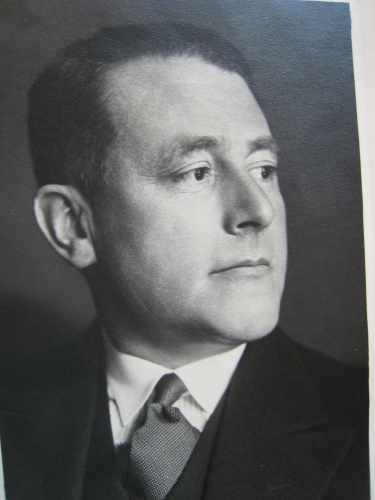
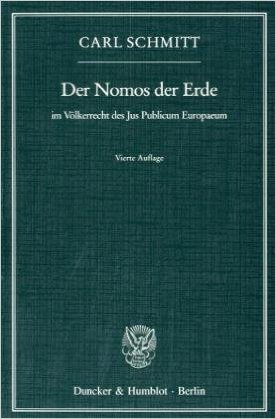 La complessa produzione di Carl Schmitt, tanto affascinante quanto labirintica, ha dato un contributo fondamentale alla comprensione del nichilismo e ai processi di secolarizzazione e neutralizzazione che l’hanno provocato. Spinto da un’inesorabile volontà di esorcizzare la crisi e la negatività in cui stava precipitando la decadente Europa d’inizio Novecento, il giurista tedesco si confronta impavidamente con la “potenza del Niente” – esperienza cruciale per la comprensione di quell’epoca e per restare dentro alla filosofia, come ammonivano Jünger ed Heidegger in Oltre la linea –, tentando di opporre all’horror vacui soluzioni di volta in volta sempre più solide, concrete ed elementari, nel corso di un itinerario intellettuale lungo, tortuoso e per certi aspetti contraddittorio.
La complessa produzione di Carl Schmitt, tanto affascinante quanto labirintica, ha dato un contributo fondamentale alla comprensione del nichilismo e ai processi di secolarizzazione e neutralizzazione che l’hanno provocato. Spinto da un’inesorabile volontà di esorcizzare la crisi e la negatività in cui stava precipitando la decadente Europa d’inizio Novecento, il giurista tedesco si confronta impavidamente con la “potenza del Niente” – esperienza cruciale per la comprensione di quell’epoca e per restare dentro alla filosofia, come ammonivano Jünger ed Heidegger in Oltre la linea –, tentando di opporre all’horror vacui soluzioni di volta in volta sempre più solide, concrete ed elementari, nel corso di un itinerario intellettuale lungo, tortuoso e per certi aspetti contraddittorio.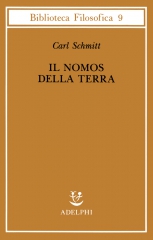 Di qui la necessità avvertita dal giurista esperto del mondo classico di recuperare l’etimologia autentica del termine νεμειν, che si articola in tre significati: “prendere, conquistare” (da cui i concetti di Landnahme e Seenahme, sviluppati in Terra e mare nel ’42); “dividere, spartire”, ad indicare la suddivisione del terreno e la conseguente nascita di un ordinamento proprietario su di esso; “pascolare”, quindi utilizzare, valorizzare, consumare. Soffermandosi sulla genesi della parola nomos Schmitt vuole restituirle la “forza e grandezza primitiva” salvandola dalla cattiva interpretazione datale dai contemporanei, che l’hanno “ridotta a designare, in maniera generica e priva di sostanza, ogni tipo di regolamentazione o disposizione normativistica”, come afferma polemicamente ne Il nomos della terra, pubblicato nel 1950 e summa del suo pensiero giuridico e politico. L’uso linguistico di “un’epoca decadente che non sa più collegarsi alle proprie origini” funzionalizza il nomos alla legge, non distinguendo tra diritto fondamentale e atti di posizione e facendo scomparire il legame con l’atto costitutivo dell’ordinamento spaziale.
Di qui la necessità avvertita dal giurista esperto del mondo classico di recuperare l’etimologia autentica del termine νεμειν, che si articola in tre significati: “prendere, conquistare” (da cui i concetti di Landnahme e Seenahme, sviluppati in Terra e mare nel ’42); “dividere, spartire”, ad indicare la suddivisione del terreno e la conseguente nascita di un ordinamento proprietario su di esso; “pascolare”, quindi utilizzare, valorizzare, consumare. Soffermandosi sulla genesi della parola nomos Schmitt vuole restituirle la “forza e grandezza primitiva” salvandola dalla cattiva interpretazione datale dai contemporanei, che l’hanno “ridotta a designare, in maniera generica e priva di sostanza, ogni tipo di regolamentazione o disposizione normativistica”, come afferma polemicamente ne Il nomos della terra, pubblicato nel 1950 e summa del suo pensiero giuridico e politico. L’uso linguistico di “un’epoca decadente che non sa più collegarsi alle proprie origini” funzionalizza il nomos alla legge, non distinguendo tra diritto fondamentale e atti di posizione e facendo scomparire il legame con l’atto costitutivo dell’ordinamento spaziale.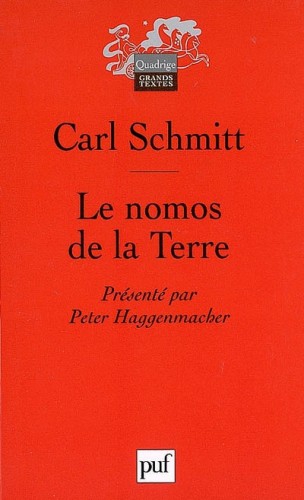 L’irrazionalità della guerra viene dunque confinata nelle amity lines del mare mentre sul suolo continentale, a mo’ di razionalizzazione effettiva del sacrificio, resta la guerre en forme tra Stati che si riconoscono reciprocamente come sovrani e che non mirano all’annichilimento o alla criminalizzazione del nemico. Una delle maggiori conquiste del diritto pubblico europeo è stata infatti la limitazione della guerra (Hegung des Krieges) e la trasformazione dal bellum iustum delle guerre civili di religione in conflitti “giusti” tra pari, tra hostes aequaliter iusti. Quest’atto di contenimento non è stato frutto delle ideologie razionalistiche, bensì della particolare condizione di equilibrio di cui l’Europa moderna ha goduto fino al 1914. Un assetto fondato non solo sulla dialettica vecchio/nuovo mondo – strumentalizzata da Schmitt, secondo alcuni, per difendere l’imperialismo e il colonialismo europeo -, ma anche sul rapporto tra terraferma e libertà del mare che ha fatto in primis le fortune dell’Inghilterra, che ha scelto di diventarne “figlia” trasformando la propria essenza storico-politica ed arrivando a dominare lo spazio liscio e uniforme.
L’irrazionalità della guerra viene dunque confinata nelle amity lines del mare mentre sul suolo continentale, a mo’ di razionalizzazione effettiva del sacrificio, resta la guerre en forme tra Stati che si riconoscono reciprocamente come sovrani e che non mirano all’annichilimento o alla criminalizzazione del nemico. Una delle maggiori conquiste del diritto pubblico europeo è stata infatti la limitazione della guerra (Hegung des Krieges) e la trasformazione dal bellum iustum delle guerre civili di religione in conflitti “giusti” tra pari, tra hostes aequaliter iusti. Quest’atto di contenimento non è stato frutto delle ideologie razionalistiche, bensì della particolare condizione di equilibrio di cui l’Europa moderna ha goduto fino al 1914. Un assetto fondato non solo sulla dialettica vecchio/nuovo mondo – strumentalizzata da Schmitt, secondo alcuni, per difendere l’imperialismo e il colonialismo europeo -, ma anche sul rapporto tra terraferma e libertà del mare che ha fatto in primis le fortune dell’Inghilterra, che ha scelto di diventarne “figlia” trasformando la propria essenza storico-politica ed arrivando a dominare lo spazio liscio e uniforme.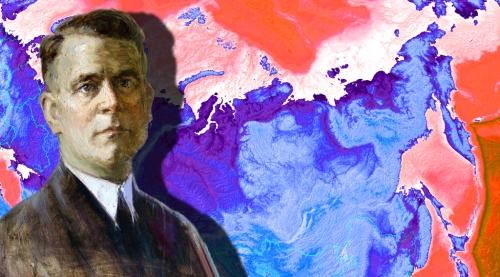
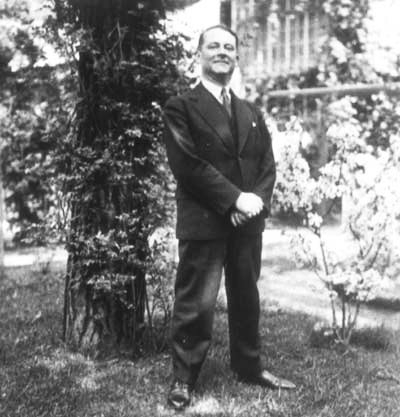 Seine analytisch eingehendste Betrachtung der politischen Nachkriegsordnung ist der Vortrag „Die Ordnung der Welt nach dem Zweiten Weltkrieg“, den Schmitt 1962 in Madrid hielt und bei Lebzeiten nur in einer spanischen Fassung publizierte. Nur hier verknüpft er seine Überlegungen auch mit der Entwicklung der UNO. Sein Ausgangspunkt ist die Dekolonialisierung und der „Antikolonialismus“ nach 1945, den Schmitt als „Propaganda“ und „Reflex“ der Zerstörung der alten, europäischen Raumordnung betrachtet. Diese „anti-europäische Propaganda“ begann „leider“, betont Schmitt, als „inner-europäische Kampagne“ (SGN 594). Gegenstück sei der „Nomos des Kosmos“ (SGN 595): „Der Anti-Kolonialismus ist nichts anderes als die Liquidierung einer historischen Vergangenheit auf Kosten der europäischen Nationen. Die Eroberung des Kosmos hingegen ist pure Zukunft“ (SGN 596), schreibt Schmitt. Dazwischen sei der gegenwärtige „Nomos der Erde“ zu suchen. Schmitt nähert sich ihm mit Überlegungen zum Kalten Krieg als „Teil des revolutionären Krieges“. Er rekapituliert hier Überlegungen zur Wiederkehr der Lehre vom „gerechten Krieg“. Deutlicher benennt er nun aber „drei Stadien des Kalten Krieges“ und kennzeichnet die Gegenwart dabei durch ein „pluralistisches Stadium“, in dem sich eine „erstaunliche Zahl neuer afrikanischer und asiatischer Staaten“ (SGN 602) der dualistischen Struktur des Ost-West-Gegensatzes nicht mehr fügten und die UNO zum Forum der politischen Organisation einer „dritten Front“ nutzten. In der „Theorie des Partisanen“ nennt er an dieser Stelle dann China und Maos „pluralistische Vorstellung eines neuen Nomos der Erde“ (TP 62).
Seine analytisch eingehendste Betrachtung der politischen Nachkriegsordnung ist der Vortrag „Die Ordnung der Welt nach dem Zweiten Weltkrieg“, den Schmitt 1962 in Madrid hielt und bei Lebzeiten nur in einer spanischen Fassung publizierte. Nur hier verknüpft er seine Überlegungen auch mit der Entwicklung der UNO. Sein Ausgangspunkt ist die Dekolonialisierung und der „Antikolonialismus“ nach 1945, den Schmitt als „Propaganda“ und „Reflex“ der Zerstörung der alten, europäischen Raumordnung betrachtet. Diese „anti-europäische Propaganda“ begann „leider“, betont Schmitt, als „inner-europäische Kampagne“ (SGN 594). Gegenstück sei der „Nomos des Kosmos“ (SGN 595): „Der Anti-Kolonialismus ist nichts anderes als die Liquidierung einer historischen Vergangenheit auf Kosten der europäischen Nationen. Die Eroberung des Kosmos hingegen ist pure Zukunft“ (SGN 596), schreibt Schmitt. Dazwischen sei der gegenwärtige „Nomos der Erde“ zu suchen. Schmitt nähert sich ihm mit Überlegungen zum Kalten Krieg als „Teil des revolutionären Krieges“. Er rekapituliert hier Überlegungen zur Wiederkehr der Lehre vom „gerechten Krieg“. Deutlicher benennt er nun aber „drei Stadien des Kalten Krieges“ und kennzeichnet die Gegenwart dabei durch ein „pluralistisches Stadium“, in dem sich eine „erstaunliche Zahl neuer afrikanischer und asiatischer Staaten“ (SGN 602) der dualistischen Struktur des Ost-West-Gegensatzes nicht mehr fügten und die UNO zum Forum der politischen Organisation einer „dritten Front“ nutzten. In der „Theorie des Partisanen“ nennt er an dieser Stelle dann China und Maos „pluralistische Vorstellung eines neuen Nomos der Erde“ (TP 62).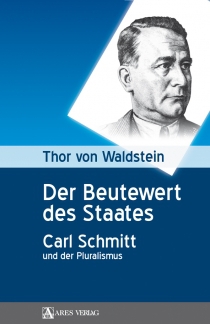 Kirchheimer, Neumann und Fraenkel waren Schmitt nicht unkritisch gefolgt. Sie hatten ihn politisch wie rechtstheoretisch abgeklärt rezipiert, so dass Berührungsscheu nach 1949 nicht nötig schien. Aus dem „Fall“ Schmitt ließ sich deshalb auch kein „Fall“ Habermas machen. Der von Ellen Kennedy33 formulierte Verdacht lautete dennoch vereinfacht gesagt, dass Habermas von seinen frühen politischen Schriften bis in die Deutung der „Friedensbewegung“ der 80er Jahre hinein um den Preis ideologischer Verblendung von Schmitt beeinflusst war. Habermas’ Replik „Die Schrecken der Autonomie“ grenzte den eigenen, kommunikationstheoretisch entwickelten Begriff der „normativen Grundlagen der Demokratie“ von Schmitt ab. Demnach hält Habermas nicht Schmitts Liberalismuskritik für fruchtbar, sondern dessen Überlegungen zu den normativen Grundlagen der Demokratie. Er schreibt:
Kirchheimer, Neumann und Fraenkel waren Schmitt nicht unkritisch gefolgt. Sie hatten ihn politisch wie rechtstheoretisch abgeklärt rezipiert, so dass Berührungsscheu nach 1949 nicht nötig schien. Aus dem „Fall“ Schmitt ließ sich deshalb auch kein „Fall“ Habermas machen. Der von Ellen Kennedy33 formulierte Verdacht lautete dennoch vereinfacht gesagt, dass Habermas von seinen frühen politischen Schriften bis in die Deutung der „Friedensbewegung“ der 80er Jahre hinein um den Preis ideologischer Verblendung von Schmitt beeinflusst war. Habermas’ Replik „Die Schrecken der Autonomie“ grenzte den eigenen, kommunikationstheoretisch entwickelten Begriff der „normativen Grundlagen der Demokratie“ von Schmitt ab. Demnach hält Habermas nicht Schmitts Liberalismuskritik für fruchtbar, sondern dessen Überlegungen zu den normativen Grundlagen der Demokratie. Er schreibt:
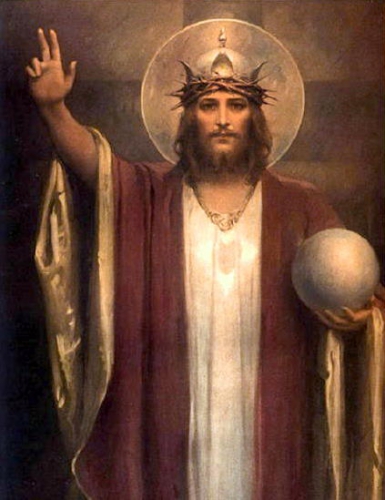
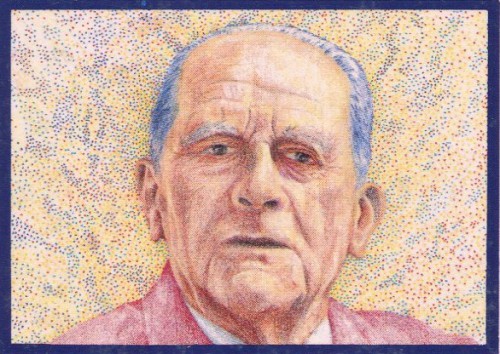
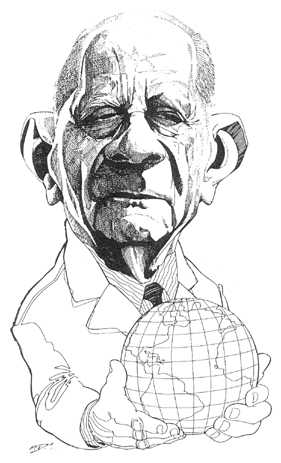





 Carl Schmitt consideraba la tierra como un todo único y buscaba su misión global. Este “todo” fue recogido por Schmitt en el concepto de Nomos. Schmitt usó la palabra griega derivada del verbo «nemein», que es idéntico al alemán “nehmen”, “tomar”. El Nomos comprende tres actos del drama: la “toma”, “la división y distribución de lo tomado”, “la explotación y el uso de lo tomado y distribuido”. Según Schmitt, el Nomos de la Tierra existió siempre. El Primer Nomos es descrito como la “tierra prometida” de los pueblos antiguos. Es el Nomos de la antigüedad y la Edad Media. Dejó de existir después de la exploración de los grandes océanos y el continente americano. Así comenzó el Segundo Nomos, el Nomos de los estados nacionales soberanos que tenían estructura eurocéntrica. Los acontecimientos de la Segunda Guerra Mundial condujeron a su destrucción, por lo que la tierra fue dividida en este y oeste, ambos en un estado de “guerra fría”. No se trata de meros opuestos geográficos, sino de contraposiciones más originales y profundas. Carl Schmitt escribió: “Toda la historia de la confrontación planetaria de Oriente y Occidente en su totalidad es reducible al dualismo fundamental de los elementos: la tierra y el agua, la tierra y el mar. Lo que ahora llamamos el Oriente, es una sola masa de sólida tierra: Rusia, China y la India – un enorme pedazo de tierra, la “Tierra Media” [“Middle Earth”], como es llamada por el gran geógrafo inglés Sir Halford Mackinder. Lo que hoy llamamos Occidente, es uno de los océanos mundiales, un hemisferio donde se sitúan los océanos Atlántico y Pacífico. La confrontación de las potencias, de los mundos marítimo y terrestre, es la verdad global que está en el corazón de la explicación del dualismo de civilizaciones que genera constantemente una tensión planetaria y estimula todo el proceso de la historia”. Por lo tanto, el nacimiento de un tercer Nomos fue causado por la división del mundo entre el Oeste y el Este. Sin embargo, fue destruido con la caída del muro de Berlín y el colapso de la Unión Soviética.
Carl Schmitt consideraba la tierra como un todo único y buscaba su misión global. Este “todo” fue recogido por Schmitt en el concepto de Nomos. Schmitt usó la palabra griega derivada del verbo «nemein», que es idéntico al alemán “nehmen”, “tomar”. El Nomos comprende tres actos del drama: la “toma”, “la división y distribución de lo tomado”, “la explotación y el uso de lo tomado y distribuido”. Según Schmitt, el Nomos de la Tierra existió siempre. El Primer Nomos es descrito como la “tierra prometida” de los pueblos antiguos. Es el Nomos de la antigüedad y la Edad Media. Dejó de existir después de la exploración de los grandes océanos y el continente americano. Así comenzó el Segundo Nomos, el Nomos de los estados nacionales soberanos que tenían estructura eurocéntrica. Los acontecimientos de la Segunda Guerra Mundial condujeron a su destrucción, por lo que la tierra fue dividida en este y oeste, ambos en un estado de “guerra fría”. No se trata de meros opuestos geográficos, sino de contraposiciones más originales y profundas. Carl Schmitt escribió: “Toda la historia de la confrontación planetaria de Oriente y Occidente en su totalidad es reducible al dualismo fundamental de los elementos: la tierra y el agua, la tierra y el mar. Lo que ahora llamamos el Oriente, es una sola masa de sólida tierra: Rusia, China y la India – un enorme pedazo de tierra, la “Tierra Media” [“Middle Earth”], como es llamada por el gran geógrafo inglés Sir Halford Mackinder. Lo que hoy llamamos Occidente, es uno de los océanos mundiales, un hemisferio donde se sitúan los océanos Atlántico y Pacífico. La confrontación de las potencias, de los mundos marítimo y terrestre, es la verdad global que está en el corazón de la explicación del dualismo de civilizaciones que genera constantemente una tensión planetaria y estimula todo el proceso de la historia”. Por lo tanto, el nacimiento de un tercer Nomos fue causado por la división del mundo entre el Oeste y el Este. Sin embargo, fue destruido con la caída del muro de Berlín y el colapso de la Unión Soviética.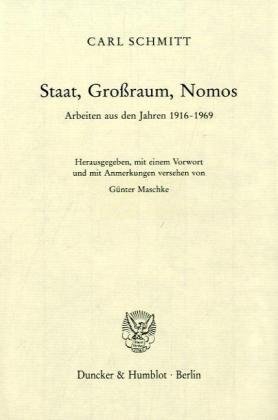 Sin embargo, debemos admitir que durante las últimas décadas, Rusia se alejó cada vez más de su propósito original de ser un puente entre Oriente y Occidente. El interregno puede ser nuestra oportunidad de recuperarse, una oportunidad para Rusia para convertirse y ser. La teoría de un mundo multipolar puede ser considerada como el punto de partida del fin de la era unipolar y el de entrada en el período “post-norteamericano”, una característica del cual será la presencia de varios polos (los sujetos del diálogo inter-civilizacional), y la segura eliminación de la crisis de identidad, porque en un mundo multipolar la identidad adquiere un carácter civilizatorio. Hoy nuestro diálogo con Europa es un diálogo de “grandes espacios”; en el nuevo sistema de relaciones internacionales el Großraum [el “Gran espacio” de Carl Schmitt] se convierte en un concepto operativo de la multipolaridad. Alexander Dugin ofrece el modelo “CUATRO polar” o “cuadri-polar” del mundo, que consta de cuatro zonas.
Sin embargo, debemos admitir que durante las últimas décadas, Rusia se alejó cada vez más de su propósito original de ser un puente entre Oriente y Occidente. El interregno puede ser nuestra oportunidad de recuperarse, una oportunidad para Rusia para convertirse y ser. La teoría de un mundo multipolar puede ser considerada como el punto de partida del fin de la era unipolar y el de entrada en el período “post-norteamericano”, una característica del cual será la presencia de varios polos (los sujetos del diálogo inter-civilizacional), y la segura eliminación de la crisis de identidad, porque en un mundo multipolar la identidad adquiere un carácter civilizatorio. Hoy nuestro diálogo con Europa es un diálogo de “grandes espacios”; en el nuevo sistema de relaciones internacionales el Großraum [el “Gran espacio” de Carl Schmitt] se convierte en un concepto operativo de la multipolaridad. Alexander Dugin ofrece el modelo “CUATRO polar” o “cuadri-polar” del mundo, que consta de cuatro zonas.

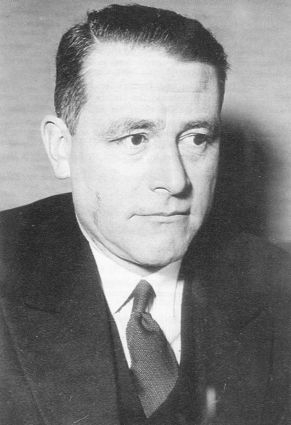 OVER THE past few years, the conviction that the end of the Cold War inaugurated an era of great-power peace to accompany the inevitable spread of democratic capitalism has been shattered. In Georgia and Ukraine, thousands have died as Washington’s attempt to fence in Russia with NATO allies and affiliates has been answered by Moscow’s determination to rebuild a Eurasian sphere of influence. In East Asia, China’s growing assertiveness has alarmed its neighbors and collided with America’s determination to remain the dominant power in the region. Regime-change efforts sponsored by the United States and its allies in Iraq, Libya and Syria have created power vacuums and bloody regional proxy wars, to the benefit of Al Qaeda and the Islamic State.
OVER THE past few years, the conviction that the end of the Cold War inaugurated an era of great-power peace to accompany the inevitable spread of democratic capitalism has been shattered. In Georgia and Ukraine, thousands have died as Washington’s attempt to fence in Russia with NATO allies and affiliates has been answered by Moscow’s determination to rebuild a Eurasian sphere of influence. In East Asia, China’s growing assertiveness has alarmed its neighbors and collided with America’s determination to remain the dominant power in the region. Regime-change efforts sponsored by the United States and its allies in Iraq, Libya and Syria have created power vacuums and bloody regional proxy wars, to the benefit of Al Qaeda and the Islamic State.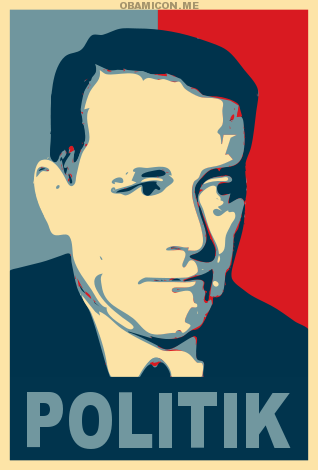 An alternative approach, the so-called Central European approach, favors redrawing arbitrary political boundaries to create more homogeneous ethnic or linguistic groups. Neither doctrine is inherently illiberal. In his Representative Government, John Stuart Mill thus argued that liberal, representative government is most likely to succeed in countries in which most of the citizens share at least a common language, a thesis that the continuing disintegration of multiethnic states in our time would appear to confirm. In Mill’s words, “Free institutions are next to impossible in a country made up of different nationalities. Among a people without fellow-feeling, especially if they read and speak different languages, the united public opinion, necessary to the working of representative government, cannot exist.” Neither approach to defining the citizens of sovereign states equates political independence of one community from another with inherent and unremitting enmity.
An alternative approach, the so-called Central European approach, favors redrawing arbitrary political boundaries to create more homogeneous ethnic or linguistic groups. Neither doctrine is inherently illiberal. In his Representative Government, John Stuart Mill thus argued that liberal, representative government is most likely to succeed in countries in which most of the citizens share at least a common language, a thesis that the continuing disintegration of multiethnic states in our time would appear to confirm. In Mill’s words, “Free institutions are next to impossible in a country made up of different nationalities. Among a people without fellow-feeling, especially if they read and speak different languages, the united public opinion, necessary to the working of representative government, cannot exist.” Neither approach to defining the citizens of sovereign states equates political independence of one community from another with inherent and unremitting enmity.
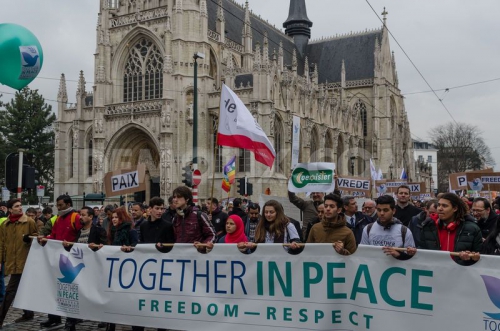

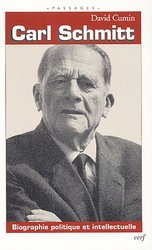 PHILITT :
PHILITT :  David Cumin : Absolument, Le Nomos de la terre et L’Évolution vers un concept discriminatoire de guerre restent deux ouvrages tout à fait incontournables. Le Nomos de la terre est absolument fondamental en droit international, en droit de la guerre. De même que la théorie du partisan, qui pourrait être améliorée, amendée, actualisée, mais demeure incontournable. On peut d’ailleurs regretter que ce ne soit que très récemment que les spécialistes français en droit international se soient intéressés à Schmitt. Pourtant il y a toujours eu chez lui ces deux piliers : droit constitutionnel et droit international. Par exemple, ses écrits sur la Société des Nations sont tout à fait transposables à l’ONU et donc tout à fait d’actualité.
David Cumin : Absolument, Le Nomos de la terre et L’Évolution vers un concept discriminatoire de guerre restent deux ouvrages tout à fait incontournables. Le Nomos de la terre est absolument fondamental en droit international, en droit de la guerre. De même que la théorie du partisan, qui pourrait être améliorée, amendée, actualisée, mais demeure incontournable. On peut d’ailleurs regretter que ce ne soit que très récemment que les spécialistes français en droit international se soient intéressés à Schmitt. Pourtant il y a toujours eu chez lui ces deux piliers : droit constitutionnel et droit international. Par exemple, ses écrits sur la Société des Nations sont tout à fait transposables à l’ONU et donc tout à fait d’actualité.
 All that should be impressive enough for a discredited, long dead authoritarian thinker. But Schmitt’s dictum also became a philosophical foundation for the exercise of American global power in the quarter century that followed the end of the Cold War. Washington, more than any other power, created the modern international community of laws and treaties, yet it now reserves the right to defy those same laws with impunity. A sovereign ruler should, said Schmitt, discard laws in times of national emergency. So the United States, as the planet’s last superpower or, in Schmitt’s terms, its global sovereign, has in these years repeatedly ignored international law, following instead its own unwritten rules of the road for the exercise of world power.
All that should be impressive enough for a discredited, long dead authoritarian thinker. But Schmitt’s dictum also became a philosophical foundation for the exercise of American global power in the quarter century that followed the end of the Cold War. Washington, more than any other power, created the modern international community of laws and treaties, yet it now reserves the right to defy those same laws with impunity. A sovereign ruler should, said Schmitt, discard laws in times of national emergency. So the United States, as the planet’s last superpower or, in Schmitt’s terms, its global sovereign, has in these years repeatedly ignored international law, following instead its own unwritten rules of the road for the exercise of world power.